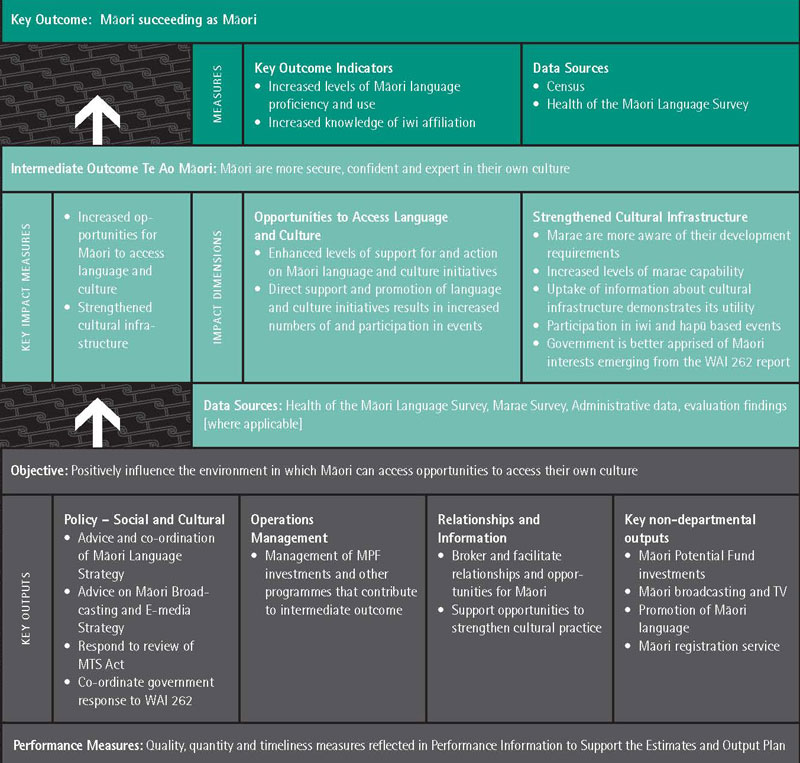
Statement of Intent 2009-2012
Table of contents
- Foreword from Ministers
- Ministerial Statement of Responsibility
- Introduction from the Chief Executive
- Chief Executive Statement of Responsibility
- Nature and Scope of Functions
- Strategic Direction
- Operating Intentions
- Managing in a Changeable Operating Environment
- Assessing Organisational Health and Capability
Operating Intentions
In pursuit of a revised set of outcome priorities, and against the backdrop of fiscal constraint and the need to demonstrate value for money, we have necessarily had to reprioritise our mix of outputs. The diagram on page 15 provides a high level overview of our outcome, impact, output and performance framework. A more detailed description of each outcome, the activities that are delivered in pursuit of that outcome, the anticipated impacts of those activities, and the associated performance framework is provided under each of the outcome areas.
Figure 2: Performance Framework
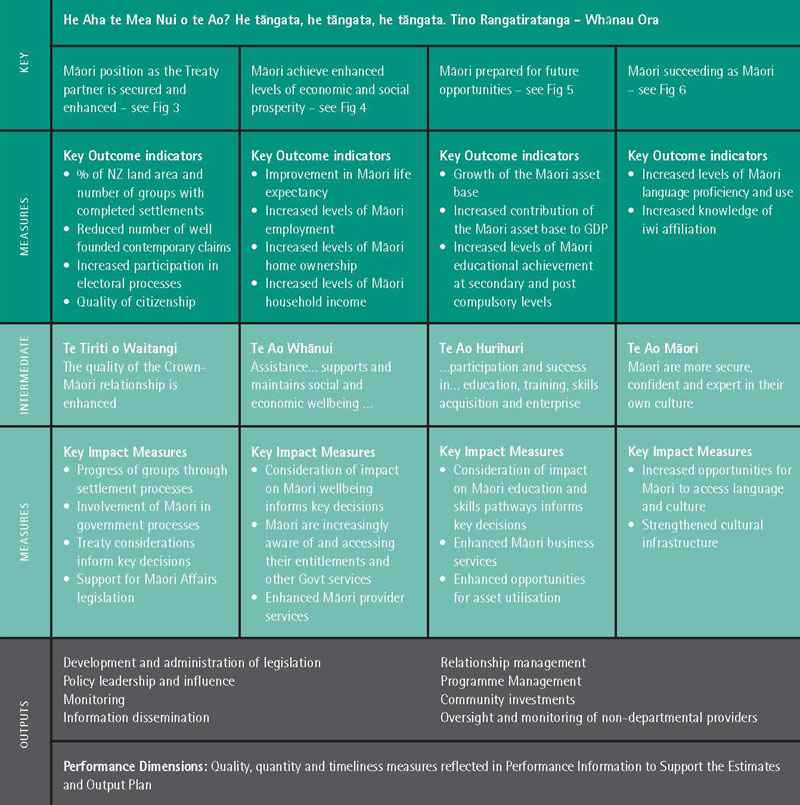
Māori Position as the Treaty Partner is Secured and Enhanced
Context
The Treaty of Waitangi is the founding document of New Zealand. It created a nation based on the acceptance of the partnership promise that is inherent within the Treaty. Māori view the Treaty as under-pinning their development, laying the blueprint for economic independence, and a relationship with the Crown based on mutual respect and good faith. For the Crown, the essential bargain created by the Treaty requires the active protection of all things of importance to Māori, but most importantly, the protection of rangatiratanga as it is through the exercise of rangatiratanga that Māori define their own development preferences and norms. The Treaty is also the starting point for the process of reconciliation between iwi, hapū and the Crown.
What we are seeking to achieve
The outcome we are pursuing, and which is contributed to across Government, is to ensure that the Māori position as the Treaty partner is secured and enhanced.
Achievement of this outcome reflects a state in which the quality of the Treaty partnership is evident through:
- the completion of the process of reconciliation between the Crown and iwi and hapū;
- the on-going consideration of the Treaty of Waitangi in Government decision making process, to the extent that Government decisions do not give rise to contemporary breaches of the Treaty;
- the participation of Māori in the systems of Government, including representational participation, decision making participation, and participation in democratic processes; and,
- an equitable quality of citizenship experienced by Māori according to their own aspirations, preferences and norms.
An environment in which the Treaty partnership is recognised, respected, and acted on is a necessary pre-requisite to enabling New Zealand as a whole to move forward together with a common purpose and a shared commitment to an optimistic future. The Government’s goal of settling all historical Treaty grievances by 2014 contributes to the achievement of this outcome.
What we are doing to contribute towards achieving this
Achieving this outcome is a shared responsibility across Government, and of the Treaty partner. Our specific contributions to this outcome centre on the extent to which our activities enhance the quality of the Crown-Māori relationship. Key areas of impact which are able to be demonstrated through our activities include:
- contributing to the progress of groups through settlement processes;
- an enhanced level of involvement of Māori in government processes;
- ensuring that Treaty considerations inform key government decisions; and,
- ensuring we optimise support for Māori Affairs legislation.
The objective of key dimensions of our work, which are expected to result in these impacts, is to positively influence the engagement and understanding between Māori and the Crown on issues of mutual interest. Key areas of work include:
Support for facilitating Treaty settlements, through:
- providing advice on the development of Treaty settlement policies;
- mandate assessment and advice;
- providing facilitation and mediation to resolve inter and intra iwi, and Crown-Māori, disputes that arise prior to and during the negotiations process;
- providing advice on settlement ratification processes;
- supporting the establishment and capacity building of post settlement governance entities;
- providing advice on the disposal of surplus Crown land under the protection mechanism; and,
- leading work to progress issues that arise from settlement negotiations, but do not form part of a Treaty Settlement.
On a related note, although not directly a component of facilitating Treaty settlements, we prepare for tabling in the House of Representatives, an annual report on the progress made by the Crown in implementing recommendations of the Waitangi Tribunal.
Advice on property rights with respect to natural resources including:
- advice on issues of especial interest to Māori, with an immediate focus on freshwater and co-management arrangements;
- advice on the review of the Foreshore and Seabed Act; and,
- participation in Foreshore and Seabed negotiations.
Development and administration of Māori Affairs and related legislation, including:
- supporting the progress of existing Māori Affairs Bills in the House according to Government priorities for those Bills;
- development of new legislation to give effect to Māori Affairs related policy decisions that require new or amending legislation; and,
- administering legislation and regulations on behalf of the Minister.
Representation and Appointments, including:
- providing advice on constitutional issues, including Māori representation;
- co-ordinating appointment processes for which the Minister of Māori Affairs is responsible, including the key appointments to the Māori Land Court Judges, Waitangi Tribunal members, Māori Trustee, and members of Te Māngai Pāho, Te Taura Whiri i te Reo Māori and the Māori Television Service;
- providing advice on nominations to Government appointed organisations and bodies; and
- Building an evidence base to understand and measure state sector effectiveness for Māori.
International responsibilities, including:
- participation in key international fora as appropriate, particularly the United Nations Permanent Forum on Indigenous Issues and CANZUS;
- providing advice as required on New Zealand’s international obligations, particularly to inform reporting to the United Nations Human Rights Council and Committee on the Elimination of Racial Discrimination.
Community level interventions and programme management, including:
- Brokering and facilitating relationships and opportunities between Māori and central and local government;
- Providing advice on engagement between Māori communities and the Government;
- Managing and monitoring all investments made through Māori Potential Funds that support enhancing the Crown-Māori relationship;
- Evaluating a selection of Māori Potential Fund initiatives that support enhancing the Crown-Māori relationship, in accordance with the agreed Evaluation Strategy and priorities; and,
- Management of specifically appropriated for programmes or projects delivered at the community level that support enhancing the Crown-Māori relationship.
How we will demonstrate progress towards achieving this
The diagram on page 18 summarises our overall performance framework for this outcome area. Importantly, it demonstrates the linkages between our activities in this area, the impact those activities can have on the quality of the Crown-Māori relationship, and thus contribute towards enhancing and securing the position of Māori as the Treaty partner.
Figure 3: Performance Framework - Treaty Partnership
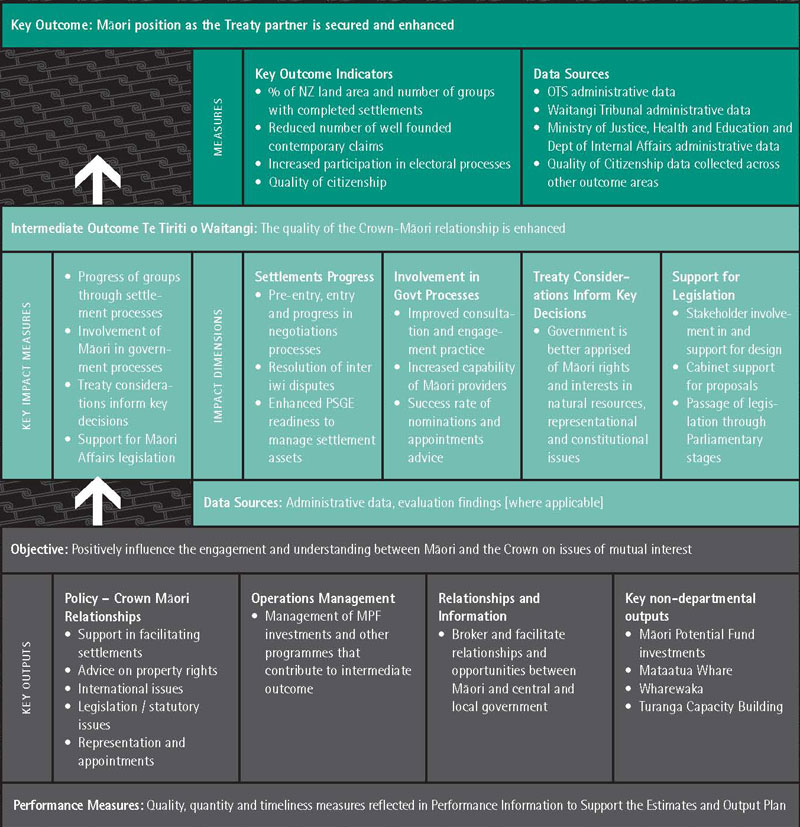
Māori Achieve Enhanced Levels of Economic and Social Prosperity
Context
While Māori have realised gains across many indicators of social and economic wellbeing, achievement levels continue to be measured against, and lag behind, those of the wider New Zealand population, a clear signal that Māori social and economic potential has yet to be fully realised. One of the key challenges is to understand the aspirations and preferences of Māori, and to shape interventions that respond to those aspirations and preferences, recognising whānau as the core unit of Māori culture and society, and the change agent through which inter-generational gains can be achieved; and building on the inherent strengths within culture. From a Treaty perspective, active protection extends to Māori interests generally, not just Article 2 rights, and Māori are guaranteed protection not just as tangata whenua, but also as citizens of New Zealand. Achieving equality of citizenship often demands the availability of different policy and service approaches, as recognised by the Waitangi Tribunal in its articulation of the principle of options.
It is widely accepted that the labour market and business profile of Māori will make them disproportionately vulnerable to recessionary effects, and that those economic effects pose heightened risk to wider aspects of wellbeing. Therefore, our most immediate concern is to support Māori through the current economic downturn.
What we are seeking to achieve
The outcome we are pursuing, and which is contributed to across Government, is for Māori to achieve enhanced levels of economic and social prosperity.
Achievement of this outcome would be characterised by a state in which Māori realise an equitable quality of citizenship in accordance with their own aspirations, preferences and norms. Consistent with our establishment legislation, the particular focus areas for this outcome are health, employment, and whānau level indicators of economic wellbeing. Accordingly, we have ascribed outcome indicators to reflect:
- Improvement in Māori life expectancy;
- Increased levels of Māori employment;
- Increased levels of Māori home ownership; and
- Increased levels of Māori household income.
At this stage, we consider these indicators to be important and relevant, but not a comprehensive reflection of a state of success for this outcome. Particular challenges arise, as data collection is typically undertaken at the level of individual achievement. In the future we will explore options for more whānau oriented measures of wellbeing and prosperity, to better reflect the intent of this outcome.
Other areas of particular importance, including education and collective wealth, are addressed in other outcome areas.
What we are doing to contribute towards achieving this
In the more immediate term, our particular priority is to ensure that assistance to Māori supports and maintains their social and economic wellbeing through the economic downturn. Key areas of impact which are able to be demonstrated through our activities include:
- Ensuring that consideration of the impact on Māori and whānau wellbeing informs key decisions made by Government in the focus areas of this outcome;
- Bringing a focus to ensuring that Māori are increasingly aware of and accessing their entitlements and other government funded services; and,
- Ensuring an enhanced availability and quality of Māori provider delivered services.
The objective of key dimensions of our work, which are expected to result in these impacts, is to positively influence the quality of life and experiences of Māori and the cultural institutions (including whānau and other collectives) to which they belong.
A new development this year arises from reprioritisation of funding within our existing budget to establish an Integrated Whānau Assistance programme, which will see the placement of community based Whānau Advocates charged with working proactively with Māori families to assist them to access their existing entitlements, and to facilitate access to government services.
Other key areas of work include:
Advice on enhancing the quality of life and experiences of Māori
- Influencing the policy settings across the employment, housing and justice sectors;
- Leading advice across government on the opportunities and benefits of whānau as a unit of intervention for policy development and programme delivery;
- Developing an evidence base to support, and leading advice across government, on the efficacy of Māori designed, developed and delivered programmes to deliver sustainable outcomes to Māori people and their families; and
- Providing discrete reports on the quality of life and experiences of Māori.
Community level interventions and programme management, including:
- Brokering and facilitating relationships and opportunities for Māori;
- Supporting the transition of Māori youth into sustainable employment and education;
- Managing and monitoring all investments made through Māori Potential Funds that support whānau wellbeing;
- Evaluating a selection of Māori Potential Fund initiatives that support enhancing whānau wellbeing, in accordance with the agreed Evaluation Strategy and priorities; and,
- Management of specifically appropriated for programmes or projects, including the Iwi Housing Support programme and the newly established Integrated Whānau Assistance programme, which incorporates the Māori Wardens’ project.
How we will demonstrate progress towards achieving this
The diagram on page 21 summarises our overall performance framework for this outcome area. Importantly, it demonstrates the linkages between our activities in this area, the impact those activities can have on supporting and maintaining Māori wellbeing during the economic downturn, and thus contribute towards the broader outcome of achieving enhanced Māori economic and social prosperity.
Figure 4: Performance Framework - Economic and Social Prosperity
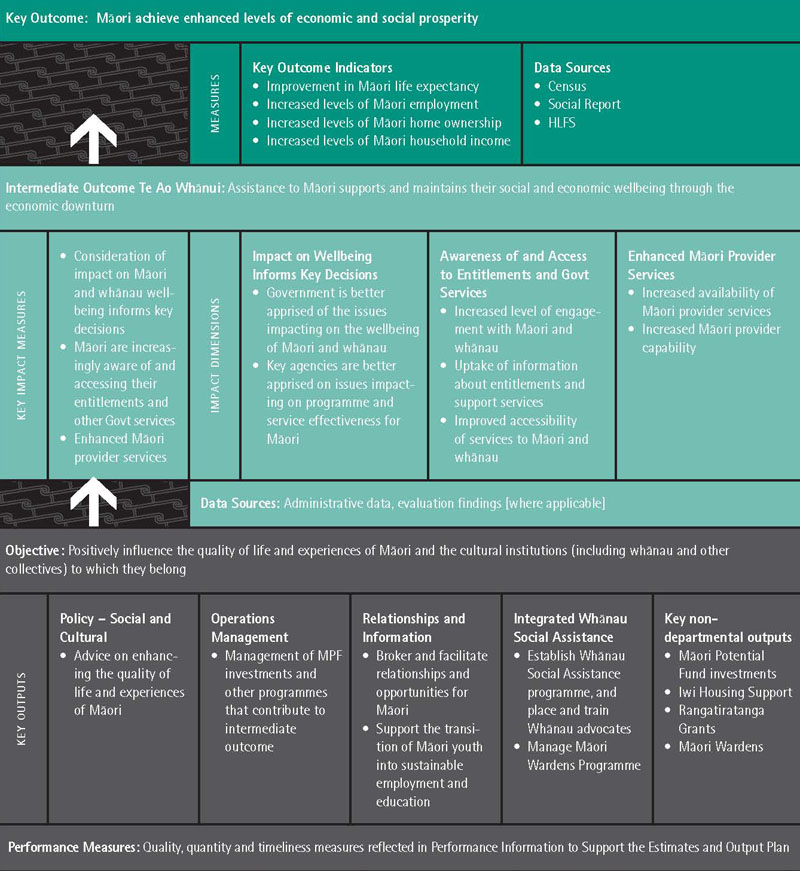
Māori Prepared for Future Opportunities
Context
Late in 2007, we released our futures work, Ngā Kaihanga Hou – For Māori Future Makers, which considered the key drivers of future change in the global economy, and the investment priorities to position Māori to capitalise on future opportunities. Key investment priorities identified as part of that work included: skills acquisition; diversification of the asset base; increasing participation in exporting; fostering entrepreneurship; and fostering innovation. During the current recessionary period, this work, and a general future focus, remains particularly important, to ensure that public policy and interventions deliver not only immediate support, but support that will position Māori favourably for both the economic recovery and the longer term economic future. This approach is consistent with the Treaty principle of the right to development, where the Tribunal, in relation to fisheries held that a fishery “as a property right, was not limited to the business as it was, or the places that existed, but had every facility to expand”.
What we are seeking to achieve
The outcome we are pursuing, and which is contributed to across Government, is for Māori to be well prepared to capitalise on future opportunities. Key success indicators for this outcome focus particularly on Māori collective wealth and productivity, and educational attainment and skills acquisition. They are:
- Growth of the Māori asset base;
- Increased contribution of the Māori asset base to GDP; and,
- Increased levels of Māori educational achievement at secondary and post compulsory levels.
What we will do to contribute to achieving this
Our contribution to this outcome is focused on Māori achieving higher levels of participation and success in the priority areas of education, training, skills acquisition and enterprise, as these are key platforms from which to drive future economic success. Importantly, the relatively youthful construct of the Māori population means that it will make up an increasingly larger proportion of the New Zealand workforce and economic engine, and thus it is critical to ensure that Māori have high standards of educational attainment and appropriate skills to drive the future economy.
Key areas of impact which are able to be demonstrated through our activities include:
- Ensuring that consideration of the impact on Māori education and skills pathways informs key decisions made by Government;
- Enhancing Māori business services; and,
- Enhancing opportunities for Māori to utilise their assets.
The objective of key dimensions of our work, which are expected to result in these impacts, is to positively influence quality of Māori participation and success in education and the economy.
A new development this year arises from reprioritisation of funding within our existing budget to support and invest in initiatives emerging from the Minister of Māori Affairs’ Economic Taskforce.
Other key areas of our work include:
Advice on enhancing the quality of life and experiences of Māori
- Influencing policy settings and decisions on matters related to education, training and skills pathways; and,
- Providing discrete reports on the quality of life and experiences of Māori.
Participation and success in the economy
- Providing discrete reports on Māori participation and success in the economy; and,
- Developing options for the establishment of a dedicated Māori business entity or dedicated Māori business services.
Enhancing Opportunities for Māori to Utilise their Assets
- Supporting the transition of the Māori Trustee to a stand-alone organisation, to ensure the provision of enhanced trustee and development services to Māori land owners by the Māori Trustee;
- Advising on the Crown’s purchase interest in the Māori Trustee;
- Advising on options for reducing barriers to the effective utilisation of Māori assets; and
- Progressing work on a new basis for the rating and valuation of Māori land.
Community level interventions and programme management, including:
- Brokering and facilitating relationships and opportunities for Māori;
- Supporting the transition of Māori youth into sustainable employment and education;
- Grow and develop Māori leadership;
- Managing and monitoring all investments made through Māori Potential Funds that support Māori participation and success in education, skills, training, enterprise and the economy;
- Evaluating a selection of Māori Potential Fund initiatives that support enhancing Māori participation and success in education, skills, training, enterprise and the economy, in accordance with the agreed Evaluation Strategy and priorities;
- Administration and delivery of the Māori Business Facilitation Service; and,
- Management of specifically appropriated for programmes or projects, including the Māori Women’s Development Fund and Regional Tourism Organisations’ appropriations.
How we will demonstrate progress towards achieving this
The diagram on page 24 summarises our overall performance framework for this outcome area. Importantly, it demonstrates the linkages between our activities in this area, the impact those activities can have on improving Māori participation and success in education, training, skills acquisition and enterprise, and thus contribute towards the broader outcome of Māori prepared for future opportunities.
Figure 5: Performance Framework - Māori Prepared for Future Opportunities
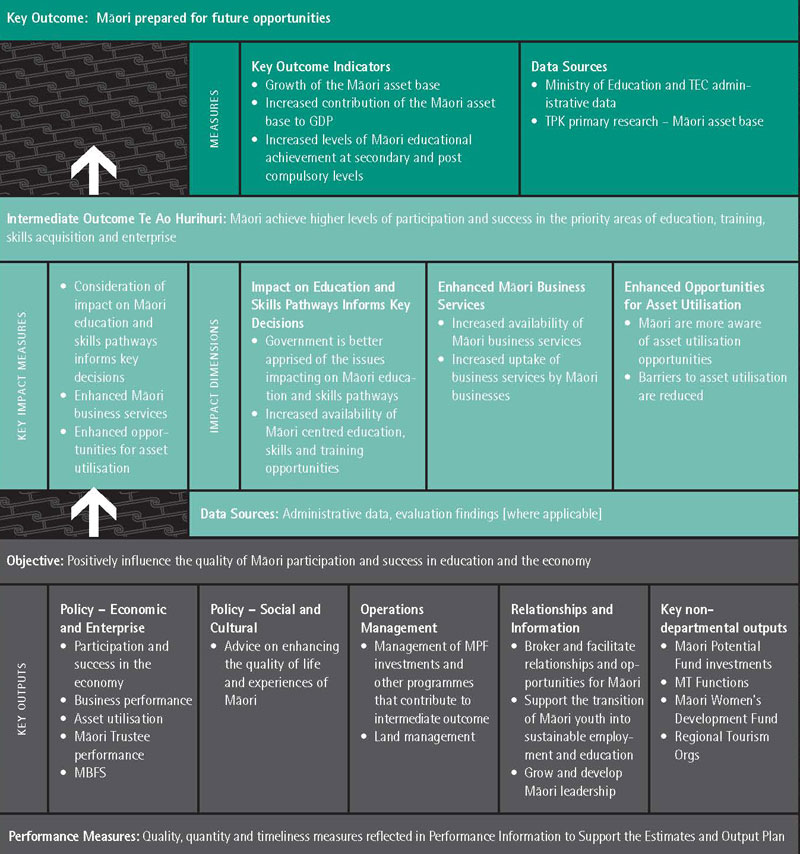
Māori Succeeding as Māori
Context
Culture is the unique and distinguishing feature of Māori vis-à-vis non-Māori, and is the foundation for the key outcome of Māori succeeding as Māori. In considering culture, we focus on two broad areas: the artefacts of culture (such as language and arts) and the values, norms, behaviours and infrastructure that shape the fabric of Māori society. It is well understood that those who have a strong sense of cultural attachment and identity are better positioned to uptake wider opportunities; and that a strong and unique indigenous culture accrues significant benefits to the nation as a whole.
What we are seeking to achieve
The outcome we are pursuing, and for which we have a leadership role across government, is Māori succeeding as Māori. The intent of this outcome is for Māori success, as New Zealanders and as global citizens, to be underpinned by their success as Māori, secure, confident and expert in their own culture. Key success indicators for this outcome focus on the cornerstones of culture: language and kinship. They are:
- Increased levels of Māori language proficiency and use; and,
- Increased knowledge of iwi affiliation.
What we will do to achieve this
Our emphasis for this outcome, and for which our activities are able to have a demonstrable impact, is that Māori are more secure, confident and expert in their own culture. Key areas of impact include:
- Increased opportunities for Māori to access language and culture; and,
- Strengthened cultural infrastructure.
The objective of key dimensions of our work, which are expected to result in these impacts, is to positively influence the environment in which Māori can access opportunities to access their own culture.
A continued focus this year arises from further reprioritisation of funding within our existing budget to support the Whānau Language Development programme, which is now in its third successful year of operation.
Other key areas of our work include:
Māori Language and Broadcasting
- Completing and implementing the results of the review of the Māori Language Strategy;
- On-going policy leadership, co-ordination and monitoring of the Māori Language Strategy;
- Investment in the Whānau Language Development programme;
- Leadership of the Government’s response to the report of the independent review panel on the Māori Television Service Act, and progressing any amendments to policy setting or legislation that arise from the review;
- On-going policy leadership of the Māori broadcasting and e-media strategy; and
- Advising on the Crown’s ownership interest in, and performance of, language and broadcasting agencies funded through Vote Māori Affairs.
Government response to WAI 262
- Leading capability development across affected agencies of the possible implications of WAI 262; and,
- Leading the Government’s response to the report of the Waitangi Tribunal on WAI 262. Commencement of this component of the work is dependent on timing of the release of the report.
Community level interventions and programme management, including:
- Brokering and facilitating relationships and opportunities for Māori;
- Supporting community based opportunities strengthening Māori cultural practice;
- Managing and monitoring all investments made through Māori Potential Funds that support Māori succeeding as Māori; and,
- Evaluating a selection of Māori Potential Fund initiatives that support Māori succeeding as Māori, in accordance with the agreed Evaluation Strategy and priorities.
How we will demonstrate progress towards achieving this
The diagram on page 27 summarises our overall performance framework for this outcome area. Importantly, it demonstrates the linkages between our activities in this area, the impact those activities can have on Māori being more secure, confident and expert in their own culture, and thus contribute towards the broader outcome of Māori succeeding as Māori.
Figure 6: Performance Framework - Māori Succeeding as Māori
